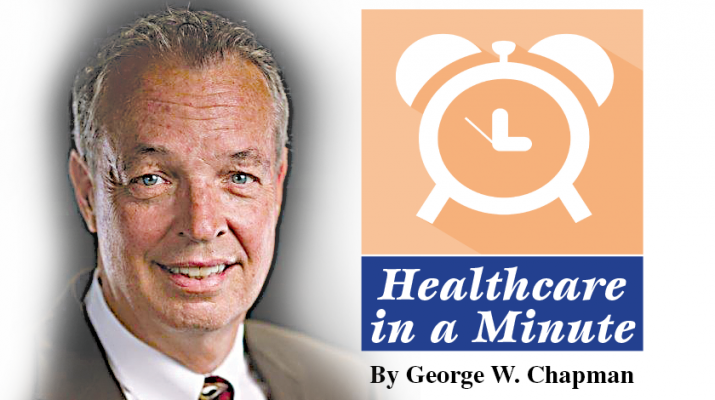By George W. Chapman
 On Feb. 22, 2024, the giant healthcare billing clearinghouse “Change Healthcare” (owned by United Healthcare Group) was hacked. It is the clearinghouse for 50% of all medical claims in the US or 15 billion claims totaling $1.5 trillion annually. It is the link between providers and payers. The American Hospital Association called the hack “the most significant attack on the healthcare system in US history.” Tens of thousands of physicians, dentists, pharmacies, hospitals and other ancillary providers can’t get paid. New York Sen. Chuck Schumer asked CMS to cut through the red tape and advance payments to providers while the clearinghouse is shut down. Too many eggs in one basket? The Department of Justice tried to block the purchase of Change Health by United Healthcare Group in 2022 but failed. As of this writing, the problem hasn’t been corrected and providers can’t get paid.
On Feb. 22, 2024, the giant healthcare billing clearinghouse “Change Healthcare” (owned by United Healthcare Group) was hacked. It is the clearinghouse for 50% of all medical claims in the US or 15 billion claims totaling $1.5 trillion annually. It is the link between providers and payers. The American Hospital Association called the hack “the most significant attack on the healthcare system in US history.” Tens of thousands of physicians, dentists, pharmacies, hospitals and other ancillary providers can’t get paid. New York Sen. Chuck Schumer asked CMS to cut through the red tape and advance payments to providers while the clearinghouse is shut down. Too many eggs in one basket? The Department of Justice tried to block the purchase of Change Health by United Healthcare Group in 2022 but failed. As of this writing, the problem hasn’t been corrected and providers can’t get paid.
Cost of US Healthcare Skyrocketing More and More
 The final number for 2023 is still being calculated, but it’s safe to say now that it will be in the neighborhood of $4.7 trillion.
The final number for 2023 is still being calculated, but it’s safe to say now that it will be in the neighborhood of $4.7 trillion.
That is well over $13,000 per capita, which is nearly double the per capita cost in other wealthy developed countries, most of which have national health plans.
As our nation continues to age and baby boomers hit their 70s, actuaries estimate that by 2030, less than seven years from now, our nation’s healthcare bill will approach an astounding $16 trillion. That’s more than triple the cost of last year.
This will be nothing short of calamitous.
If life expectancy is a good indicator of the true bottom line or getting our money’s worth, you need to look elsewhere. We don’t crack the top 50 of all countries ranked by life expectancy.
There are two outstanding contributors to our exorbitant costs that other countries with national plans or single payers don’t have to contend with. First, our countless insurers result in multiple non-clinical administrative and overhead costs and profits. (Medicare has lowest administrative costs of all insurers.) Second, we spend (and use) far more on drugs per capita. Other countries with national or single payer systems use their purchasing power to negotiate all drug prices. Not just a measly 10 prices which Congress has reluctantly allowed Medicare to do in a couple more years. If not in this election cycle, healthcare will be the No. 1 issue in 2028.
Medicare Advantage Plans
 MA plans added 1.7 million new members in 2024. The big three commercial carriers, United, Humana and Aetna, accounted for 86% of the new members. Of the big three, Aetna grabbed 60% or 476,000 new members. Nonprofit plans didn’t fare as well. The Blues attracted only 9% of new members. The steady wave of baby boomers eligible for Medicare has slowed down somewhat. Between 2015 and 2020, MA membership grew at 22%. Between 2020 and 2025, it is estimated growth will decrease to 16%. New members or younger seniors don’t generate many claims, yet. Consequentially, profits are healthy for the various MA carriers. Claims naturally increase as younger seniors become older seniors. As the steady stream of newbies or younger seniors dwindles, so will insurer profits. CMS is vigilant for carriers that will tend to mark-up or “up code” claims to increase their annual per member payments from Medicare. United is being investigated for their artificial intelligence system which denies more prior authorizations for care than traditional Medicare.
MA plans added 1.7 million new members in 2024. The big three commercial carriers, United, Humana and Aetna, accounted for 86% of the new members. Of the big three, Aetna grabbed 60% or 476,000 new members. Nonprofit plans didn’t fare as well. The Blues attracted only 9% of new members. The steady wave of baby boomers eligible for Medicare has slowed down somewhat. Between 2015 and 2020, MA membership grew at 22%. Between 2020 and 2025, it is estimated growth will decrease to 16%. New members or younger seniors don’t generate many claims, yet. Consequentially, profits are healthy for the various MA carriers. Claims naturally increase as younger seniors become older seniors. As the steady stream of newbies or younger seniors dwindles, so will insurer profits. CMS is vigilant for carriers that will tend to mark-up or “up code” claims to increase their annual per member payments from Medicare. United is being investigated for their artificial intelligence system which denies more prior authorizations for care than traditional Medicare.
Nurse Shortage Dire
By next year, 2025, we will be at a tipping point with the nursing shortage. Shortage estimates run anywhere from 200,000 to 450,000. If left unresolved, we can expect delays in treatment, a decrease in the “human touch,” increased waiting times and more stressed-out nurses retiring earlier and earlier. Primarily due to the shortage of nursing instructors, 78,000 qualified applicants to nursing schools were turned down for admission. 10% of nurse instructor openings are unfilled. The average nurse instructor is between 56 and 60 years old. Nurse PhD applicants have decreased 10% in the last decade. The shortage of teachers is impacting capacity. Thankfully, in a rare example of bipartisanship, Congress is passing legislation to bolster the “nursing pipeline.” The Train More Nurses Act (S. 2853/H.6122) requires DHHS and DOL to conduct a study and issue a report on grant programs available to mitigate the nursing and allied professional shortage. Other legislation includes The Allied Health Opportunities Act (S.2304); The Precept Nurses Act (S.1627); The Nurse Faculty Shortage Reduction Act (S.2815/H.7002); and the Occupational Workforce Training for Healthcare Act (H.6078).
Mark Cuban
The billionaire entrepreneur has been shaking up the drug industry with his “Cost Plus Drug” company. CPD currently provides more than 2,500 generic drugs to more than two million consumers. The key is pure pricing transparency which is anathema to the drug industry. Price equals actual manufacturing cost plus a moderate markup for distribution and profit. Cuban said we need to “sustain versus extort.” CPD has recently constructed an 11,000 square foot facility in Dallas to produce sterile injectables which are in short supply. They are working with the FDA on other shortages. Cuban wants to bring prices down and bring manufacturing back to the US, away from China. For example, penicillin G benzathine now costs a staggering $600 per vial. CPD is working with the FDA to produce it for $3 per vial.. Yep. Cuban wants to bypass the expensive middleman (pharmacy benefit managers) and sell directly. Established giant PBMs like CVS Caremart, Cigna Express Scripts and United’s OptumRx refuse to work with CPD. As a sign of things to come, California’s largest insurer, the Blues, has dropped their PBM, CVS Caremart and affiliated with Amazon and Prime to significantly lower drug costs.
Gun Violence Addressed
 Firearm injuries are now the No. 1 cause of death in children and young adults, according to the Kaiser Family Foundation. Statistics show there has been a 42% increase in pediatric firearm deaths between 2018 and 2022. Eighty percent of adults report gun violence as a major concern. Northwell Health recently sponsored a meeting in New York City to discuss the alarming trend. Attending were providers, researchers and government agencies. A new multi-million-dollar awareness campaign was launched. So far, $10 million was pledged to the Ad Council by Northwell, Intermountain Health, Johns Hopkins, Children’s Hospital Association and Yale New Haven Health, among others. The goal is to raise $40 million in two years. DHHS has updated and improved their reporting mechanism for tracking pediatric gun deaths. 75% of all emergency rooms participate.
Firearm injuries are now the No. 1 cause of death in children and young adults, according to the Kaiser Family Foundation. Statistics show there has been a 42% increase in pediatric firearm deaths between 2018 and 2022. Eighty percent of adults report gun violence as a major concern. Northwell Health recently sponsored a meeting in New York City to discuss the alarming trend. Attending were providers, researchers and government agencies. A new multi-million-dollar awareness campaign was launched. So far, $10 million was pledged to the Ad Council by Northwell, Intermountain Health, Johns Hopkins, Children’s Hospital Association and Yale New Haven Health, among others. The goal is to raise $40 million in two years. DHHS has updated and improved their reporting mechanism for tracking pediatric gun deaths. 75% of all emergency rooms participate.
Free Preventive Care Challenged
 The Affordable Care Act mandated that all insurers must provide certain preventive services, like immunizations and mammograms, without co-pays from patients. In a sense, they are “free.” This impacts everyone with insurance. A little-known lawsuit brought by the nonprofit Christian-sponsored Braidwood Management challenged the free preventive care mandate. Braidwood argued it should not be forced to provide preventive HIV drugs because it violated their rights under the Religious Freedom Act. And the government’s advisory committees that developed the preventive services mandate were not properly appointed by the president, which violates the Appointments clause. Basically, they argued congress cannot delegate such responsibilities to government agencies under some cases. A lower court has agreed with Braidwood. It is being appealed. Legal experts believe it will eventually go to the Supreme Court, which will probably ignore the religious freedom argument and focus on the delegation of authority argument. Recently, SCOTUS has been wary of congress delegating regulating authority to agencies, like the EPA for example.
The Affordable Care Act mandated that all insurers must provide certain preventive services, like immunizations and mammograms, without co-pays from patients. In a sense, they are “free.” This impacts everyone with insurance. A little-known lawsuit brought by the nonprofit Christian-sponsored Braidwood Management challenged the free preventive care mandate. Braidwood argued it should not be forced to provide preventive HIV drugs because it violated their rights under the Religious Freedom Act. And the government’s advisory committees that developed the preventive services mandate were not properly appointed by the president, which violates the Appointments clause. Basically, they argued congress cannot delegate such responsibilities to government agencies under some cases. A lower court has agreed with Braidwood. It is being appealed. Legal experts believe it will eventually go to the Supreme Court, which will probably ignore the religious freedom argument and focus on the delegation of authority argument. Recently, SCOTUS has been wary of congress delegating regulating authority to agencies, like the EPA for example.
 George W. Chapman is a healthcare business consultant who works exclusively with physicians, hospitals and healthcare organizations. He operates GW Chapman Consulting based in Syracuse. Email him at gwc@gwchapmanconsulting.com.
George W. Chapman is a healthcare business consultant who works exclusively with physicians, hospitals and healthcare organizations. He operates GW Chapman Consulting based in Syracuse. Email him at gwc@gwchapmanconsulting.com.

